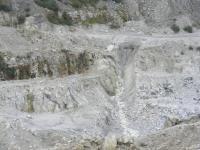POETS OF THE CLAY COUNTRY:Alan Kent
Alan was born in St Austell in 1967 and has published seven collections of poems since 1994. While Jack Clemo witnessed the growth of the clay industry in his poems from the 1950s and 60s, Alan has witnessed the industry winding down. But both have responded strongly to the landscape and to the clay workers themselves. Alan’s poems sometimes imitate the local dialect and accents.
Old Men of Granite
In Autumn 1990 Cornwall’s major employer English China Clays International announce the imminent redundancy of seven hundred and fifty of their workforce.
Never militant the Cornish
mole-mining folk of the World
so when the Board said
seven hundred odd have to gothey accepted it with that
resignness that times do change
and that men with ten year more left
must down pick and shovel and go home.The Coal miners would all be out
placards, baziers burning, news teams in
but these men accept their fate
whiter in the heart, porcelain harder to break.So men who gave everything
not to build cars or give heat from a grate
but men who donned the coat of God
and changed a Landscape’s shapemust now sit with a paper
looking over jobs they will never do,
and across needles of white waste
that pricks a too young written off pain.Time or two, they will seek
not golden handshake
but the real pay off
when the Board can do nothingwhen the dust won’t settle
and they transform
not into soft clay
but into old men made of granite.
In the next poems Alan Kent explores the landscape of the clay pits and their return to nature or adaptation to tourist attractions. In the first one, ‘War Zone’, war is used as a metaphor for the continuing fight between nature and the clay tips.
Recorded at Rescorla roadshow at St. Austell in May 2008. (The poem can be found in Druid Offsetting)
War Zone
Bees skim past.
Low level insect Tornadoes,
strifing cowarding Foxgloves,
then leaving
delicate dribbles of nectar,
left upon cracked granite.
A War zone already.The clay advances
but nature counter-attacks.
Spores lined up as artillery.
Seeds like Air-to-Ground missiles.
Rabbits droppings, - tiny cannon balls,
and every bramble thorn,
a platoon hero.On slopes, lone sniper plants
aim for targets,
often wiped out in legions though
by the jaws of earth-movers,
steel-solid and sand’s ally.
Blink twice
and no longer they grow.Return in ten years time;
See lines of stone cemeteries,
Graves to unknown soldiers,
tips marking spots of great campaigns.
The Clay never had a hope see.
Isoceles edges once white, now green,
have signed a long-term peace treaty.
Clay Euphemisms
The
tips are
not “White pyramids”
or “Cornish Alps”. They
are sad words, thrown at
tourists to make us feel good,
to hide those scars and wounds, to
give the industry a plastic surgery. But there
is no need. There is beauty here enough without a pointless cover-up.Walk
along mica
splattered lanes
where tall foxgloves
poke purple through a white
crust. Drive through a saffron sunset
where ivory tips are dizzy orange lit.Do
not ever
bend your words
to fit. Take the colours
straight, whisky without water is it.
The
tips still
grow, and conjuring
with the image, your soul
becomes poor. The truth is
the Clayland needs no deep-mined metaphor.
These poems come from Alan’s collection of poems Grunge (Lyonesse, 1994)
His most recent collection is Druid Offsetting (Lyonesse, 2008)
